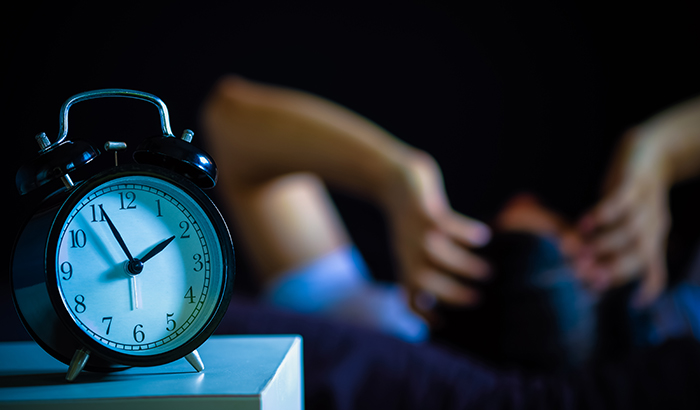Insomnia, the condition in which one has trouble falling or staying asleep, is one of the most prevalent health disorders in the United States – but also one of the least understood. It’s hard to pinpoint how many Veterans have been diagnosed with the condition. But a large study of more than 900 former service members showed that at least 50% experienced its major symptoms.
Long-term insomnia is linked to a greater risk of poor health outcomes, including mental health disorders and heart disease. Symptoms include daytime drowsiness; irritability, depression, or anxiety; attention deficits; trouble falling asleep; or an inability to sleep through the night.
Dr. Elaine Boland, a research psychologist at the Corporal Michael J. Crescenz Veterans Affairs Medical Center in Philadelphia, understands that it’s critical for people with insomnia to receive treatments tailored to their needs. This is in keeping with other areas of health care that rely on a personalized, or “precision medicine,” approach. Few empirical studies have focused on precision medicine for the sleep condition, whether on a behavioral program or medication.
`Gold standard’ status
Boland is a strong proponent of cognitive behavioral therapy for insomnia (CBT-I). She says the program has reached “gold standard” status as a treatment for adults with chronic insomnia.
CBT-I is a six- to eight-session therapy that is aimed at changing sleep habits and scheduling factors, as well as misconceptions that lead to sleep difficulties. Clinicians work one-on-one with patients to implement a series of strategies. These include finding the most suitable bedtime, restricting the amount of time spent in bed, and improving daytime habits.
Many cases of insomnia are related to poor sleep habits, depression, anxiety, lack of exercise, chronic illness, or certain drugs. The American College of Physicians recommends that behavioral programs, specifically CBT-I because of its potential for limited side effects, be initiated prior to sleep medications.
Last year, Boland co-authored a peer-reviewed article that elaborates on the pros and cons of CBT-I and prescription drugs for patients with insomnia (see sidebar). She focused on CBT-I as the leading behavioral treatment for insomnia and its ability to be tailored to a person’s needs. The article appeared in September 2019 in the journal Sleep Medicine Clinics.
Insomnia can be linked to stress, mental health
In the article, Boland wrote that one-third to one-half of Americans struggle with insomnia on at least an occasional basis. At the same time, insomnia is one of the most common health disorders but also one of the least understood.
“Part of the difficulty in truly understanding insomnia is that, like many disorders, it can have various causes and presentations,” said Boland, who is also a clinical associate at the University of Pennsylvania. “Insomnia can arise from stressful events, medical and mental health conditions, and changes in daily habits or behaviors. But it can also present differently from person to person: Some people may have a hard time falling asleep, some may fall asleep but have a hard time staying asleep, some may wake hours earlier than they want or need to, and still others can have combinations of these symptoms.
“To really understand insomnia,” she added, “we need to know more about what’s going on in the brain and body, to better analyze and develop connections between mental health symptoms and sleep disturbance, and to learn more about how these things relate to variations in clinical presentation of insomnia. Research has pushed us closer to having more answers. But the medical community still hasn’t coalesced on a singular understanding of what is happening in the body when someone is struggling with insomnia.”
Cognitive behavioral therapy targets key areas of sleep regulation
In Boland’s opinion, cognitive behavioral therapy is an effective treatment method for insomnia because it targets two key areas of sleep regulation thought to be disrupted by insomnia.
“The first target is a physical one, which is the body’s homeostatic sleep drive,” she said. “CBT-I works to strengthen and regularize the body’s own biological drive for sleep through several behavioral strategies. The second is psychological and based on classical conditioning. When people experience night after night of poor sleep, they tend to form negative associations to their bed or their sleeping environment because they spend so much time in bed fighting for sleep. Those negative psychological associations can elicit a cascade of cognitive and physiological reactions that prevent a person from getting to sleep easily. CBT-I incorporates various strategies—collectively referred to as stimulus control—that are geared toward breaking those negative associations.”
To learn more about this study, visit https://www.research.va.gov/currents/0420-Exploring-precision-medicine-for-insomnia.cfm.
To learn more about VA research on insomnia, visit the topic page section on the VA research website.
Topics in this story
More Stories
In a new series that highlights advancements in VA health care, VA researchers and clinicians are appearing on a Veteran-themed media platform—Wreaths Across America Radio—to tout their critical work.
Recently published findings from the VA Disrupted Care National Project [...]
Diverse representation of women in health care research allows MVP to make discoveries for women’s health






